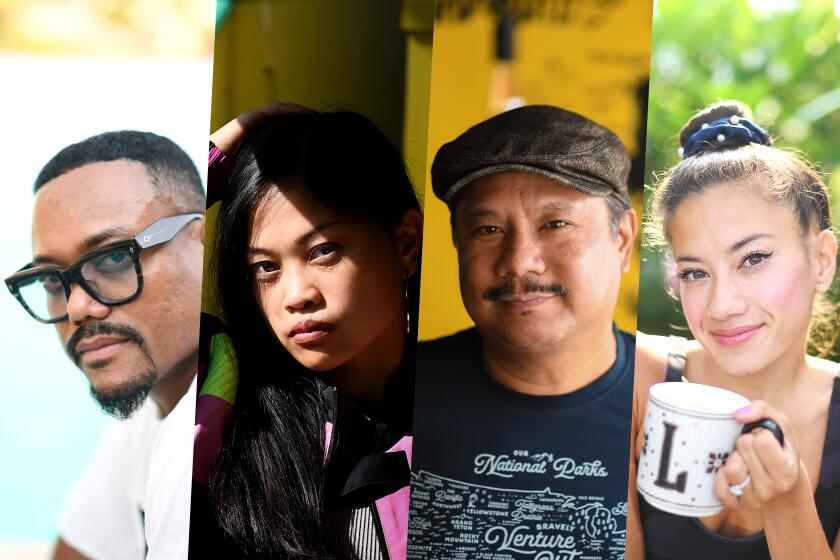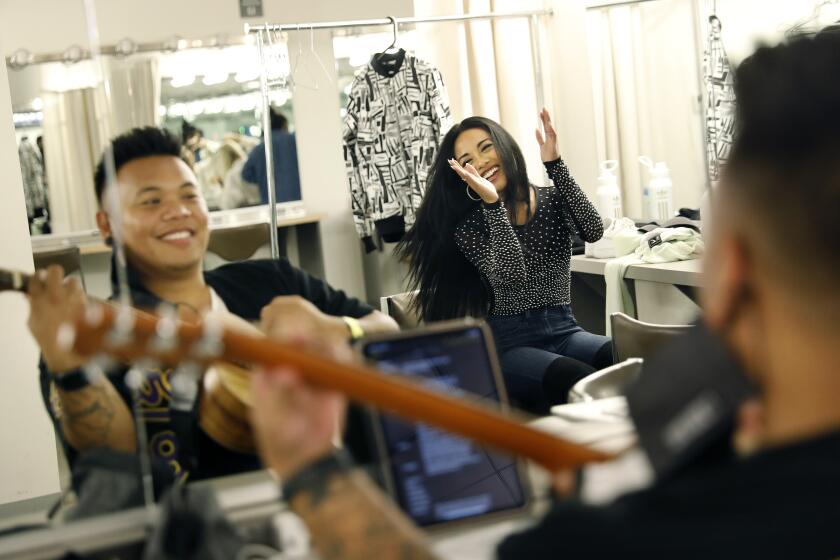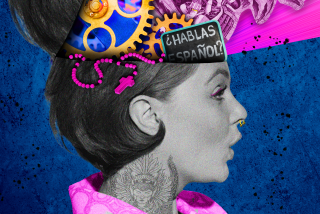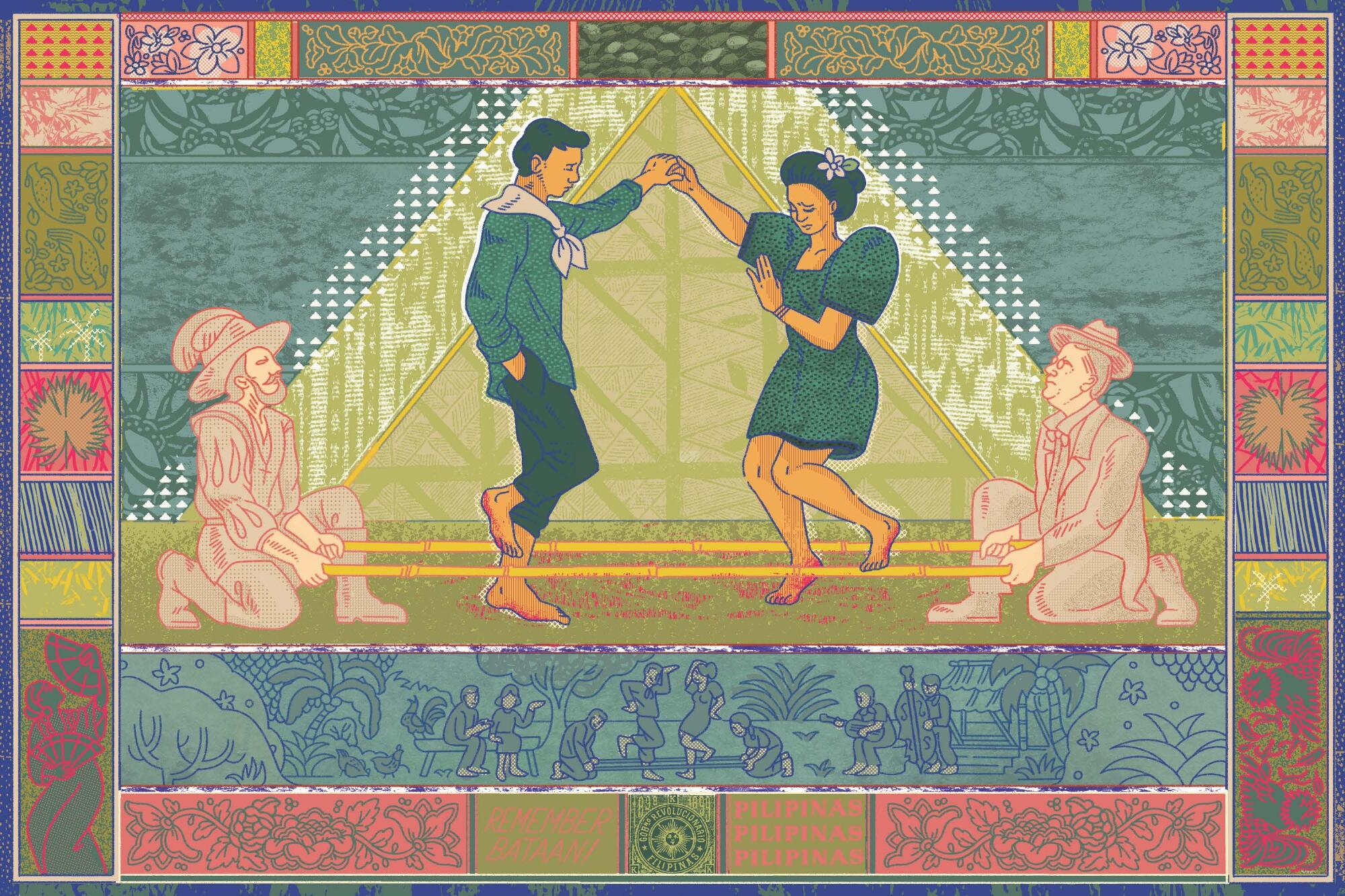
- Share via
Daniela Pila spent an hour after school one day scrubbing her brown skin with a bar of papaya soap, hoping it would turn white.
She was 12 and had never really cared much about the color of her skin. But the negative comments she had received about her physical features throughout her life had started to weigh her down.
She remembered a family member saying her nose made her look like a pig. Her classmates called her fat, ugly and damak — a Filipino term that means filthy. She saw that her peers with lighter complexions were showered with compliments.
“I was so tired of having people comment on my body and my skin tone and my body parts — things I had no control over,” said Pila, now 32, a postdoctoral researcher in critical race studies at Fordham University. “And I thought, ‘Maybe if I’m lighter skinned, people will leave me alone.’”
This is a collection of articles about mental health in the Filipino American community and the factors that influence it.
The critical comments about her appearance tore at Pila’s self-esteem. She became depressed and anxious and didn’t have any friends.
Pila’s experience isn’t unfamiliar among Filipino Americans. Many know about skin-whitening products like papaya soap. They’ve heard advice to stay out of the sun so their skin doesn’t get dark and to pinch their noses so they become sharper.
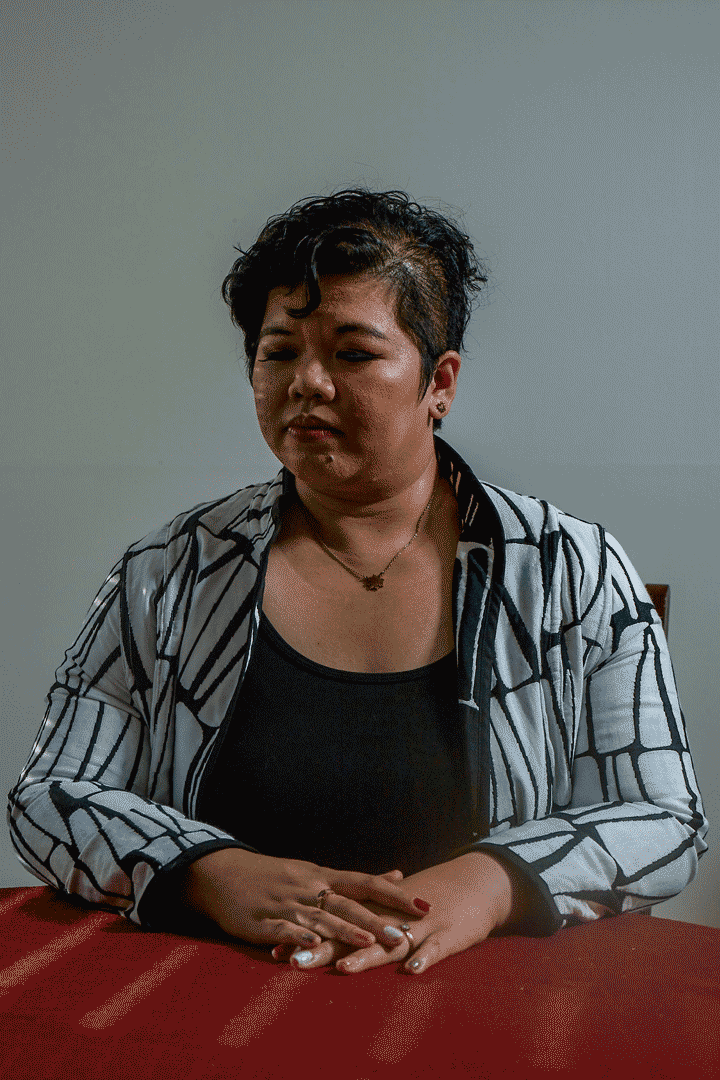
The impact of the value placed on Eurocentric features, such as lighter skin, is one of the most prominent examples of the repercussions of the Philippines’ colonial history on Filipino American mental health. Rule under Spain and the U.S. resulted in widespread internalized oppression referred to by ethnic studies scholars as colonial mentality. And colonial mentality had centuries to take hold.
The Philippines’ colonial history spans nearly 400 years, starting in the mid-16th century with Spain, which occupied the country until 1898. That’s when the Philippines declared its independence, but Spain ceded its colonial claim to the United States, which then occupied the Philippines for almost 50 years.
EJ David, a professor at the University of Alaska, Anchorage, whose research focuses on the impact of colonial mentality on Filipino Americans, said this mentality manifests in a number of ways. He said it’s seen in the community’s widespread preference for lighter skin, feelings of inferiority, shame for being Filipino and discrimination against Filipinos perceived as not Westernized enough.
“Many people have asked the question, ‘So what? Maybe it’s good for us to have colonial mentality because we can speak English well and we can get better jobs,’” David said. “‘So what if I prefer a lighter skin? Maybe it’ll make me look more beautiful and then I’ll face less discrimination.’”
But the feelings of inferiority that people experience led him to dig deeper.
“It just made theoretical sense that if you feel ashamed or embarrassed of who you are, there might be some mental health implications,” David said.
Community engagement
Let's Talk About Filipino Mental Health
Join journalist Agnes Constante, L.A. Times Utility Team assistant editor Ada Tseng, nonprofit Search to Involve Pilipino Americans and mental wellness program Change Your Algorithm this Filipino American History Month on Friday, Oct. 15, from 6 to 7:30 p.m. PT for a virtual gathering to talk about mental health.
The event will kick off Agnes’ four-part series in the Los Angeles Times about mental health in the Filipino American community, supported by the Rosalynn Carter Fellowships for Mental Health Journalism.
For more information and to RSVP: bit.ly/FilAmMentalHealth
He noted that some research suggests that an association of lighter skin tones with nobility existed in the Philippines prior to Spanish colonization, though there is no evidence this perception was widespread across ethnic groups. It was Spanish colonialism that solidified the “whiteness equals better” mentality, he said. A racial hierarchy was established where Spaniards born in Spain were at the top, while brown and darker-skinned Indigenous people were at the bottom.
This discrimination against darker-skinned individuals — or colorism — is rooted in white supremacy, David added.
Throughout Spanish colonization of the Philippines, jobs such as fishing and farming — which require people to spend hours under the sun and resulted in darker skin — became perceived as lower-class occupations. David said it didn’t happen by accident.
“More people with darker skin tones end up with such jobs because society is set up in a way that lighter-skinned people are preferred for ‘upper-class’ jobs,” he said. “Class is a key component to any serious discussion of colorism.”
Mary Toni Cerrado, 24, a San Francisco Bay Area resident, remembered attending a retreat when she was around 16 where some participants joked that “Everyone needs to keep their living spaces nice and tidy because we don’t have a Filipino maid to clean up after you.”
It’s an experience that stayed with her and led her to feel ashamed of her identity.
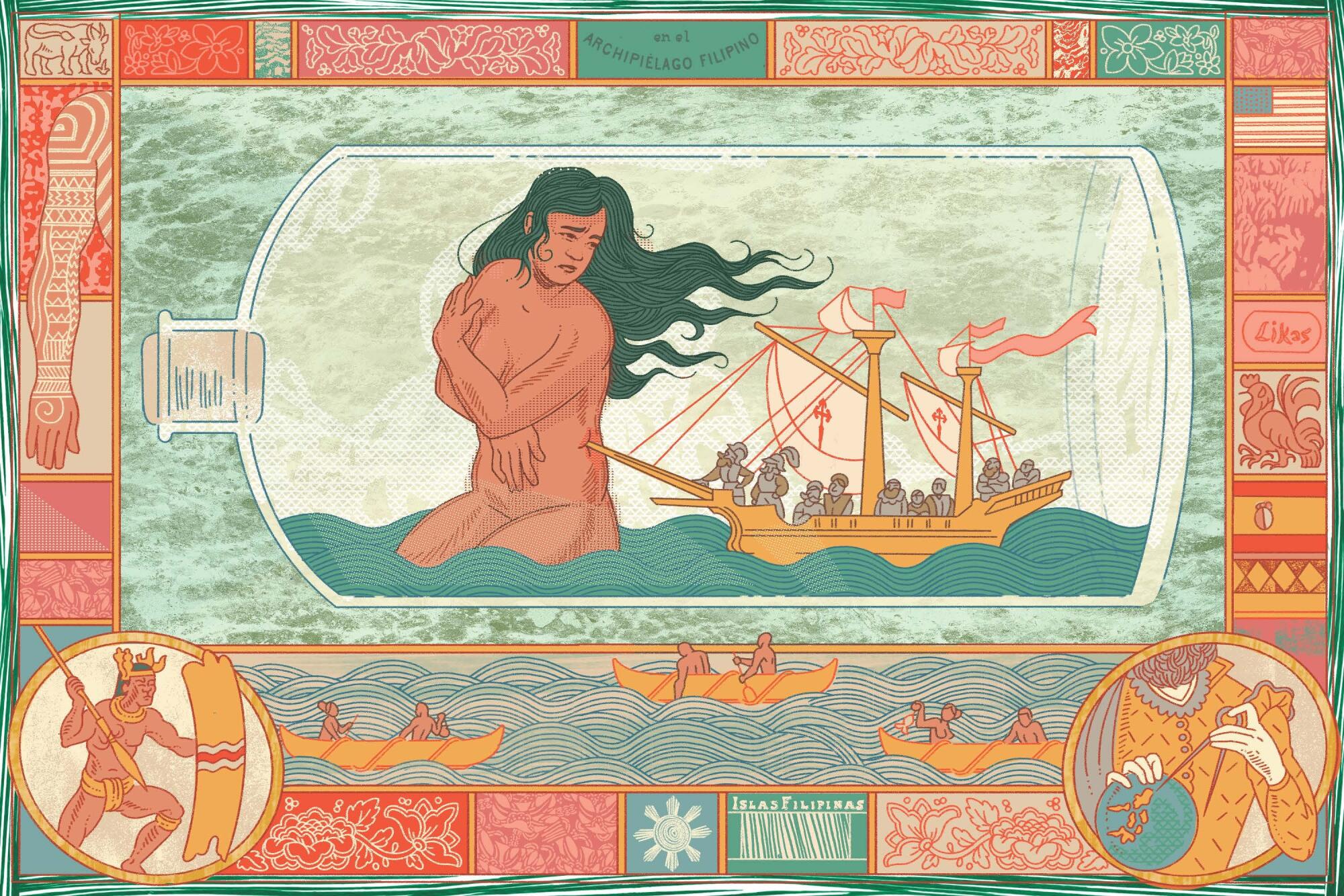
Research David conducted revealed that people with higher levels of colonial mentality tend to have lower levels of self-esteem and hold a lower regard for the ethnic group they belong to. The belief or perception that their group is inferior may lead individuals to isolation if they feel inclined to separate themselves from their family or community because they’re ashamed of them, he said. And that can leave people without a buffer — something that’s critical during challenging times.
“If you’ve disowned your family and your social support because you don’t see them as being Americanized enough, it’s hard to get that social support when you need it,” he said.
Lower self-esteem is also linked to a higher likelihood to engage in high-risk behaviors, such as substance use, as well as increased anxiety, symptoms of depression and lower levels of life satisfaction.
“Self-esteem really is an important variable when it comes to our mental health,” David said. “And the fact that colonial mentality is related to lower self-esteem was huge.”
Black Eyed Peas’ Apl.de.Ap, comic Rex Navarrete and more stars join ‘A Night of “Pinoy”tainment’ and say it’s time to stop marginalizing Filipino Americans.
Loss of language
That negative regard for self is seen in more ways than the preference for Eurocentric features like white skin, sharper noses and thin bodies. In listening sessions with 26 Filipino American mental health providers, academics and community members from across the U.S., some participants said they also saw the influence of colonialism in the loss of language.
Kayzelyn Magsino, 31, a mental health advocate in Los Angeles, moved to the United States from the Philippines when she was 3. Tagalog was her first language. But when her family arrived in the U.S., she and her siblings were advised to speak only English so they wouldn’t struggle to fit in. They lost their ability to speak their native tongue.
Magsino said losing her ability to speak Tagalog affected the way she communicated with her family. She remembered having symptoms of depression in junior high and being unable to comfortably express what she was experiencing to her family.
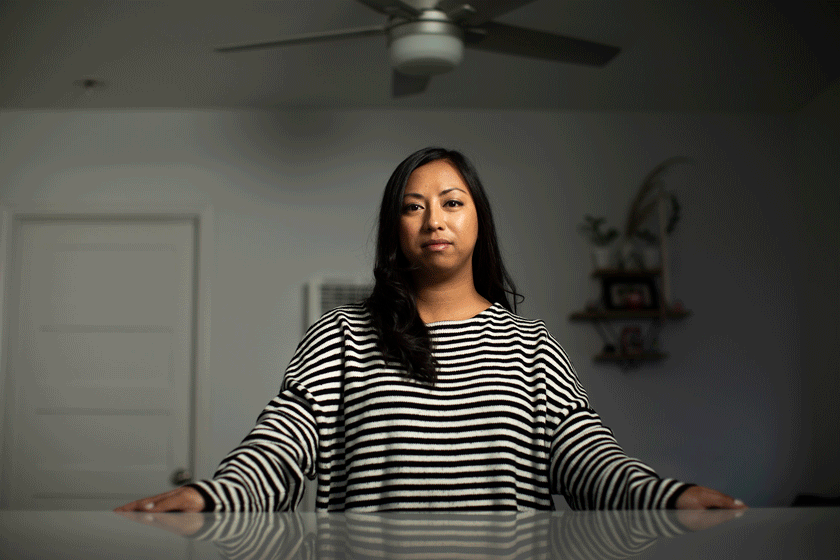
Julianna Domingo, 21, a freelance journalist in Chula Vista, moved to the United States from the Philippines when she was 10. She is no longer fluent in Tagalog.
“I think just not being able to speak it and also learn it in an academic setting, that definitely hurt [my mental health] a lot,” she said. “And there were some times that I did feel pretty insecure — even to this day — about speaking Tagalog.”
David said the loss of language is important when examining the impact of colonialism on Filipino Americans.
He noted that English is an official language in the Philippines and that many elected officials in the country conduct business in English.
“A lot of people have just automatically assumed that being able to speak English — and speak it without an accent — is a sign of intelligence,” he said.
He added that while English proficiency can provide the benefit of being able to obtain better jobs with higher salaries, it comes at the cost of relegating the more than 100 Filipino languages to inferior statuses. Losing the language results in losing part of a culture.
Invisible effects of colonial mentality
Kevin Nadal, professor of psychology at the City University of New York and author of “Filipino American Psychology,” said “every single mental health issue that any Filipino American has can at least be traced or correlated with some form of colonial mentality.”
Body image issues, inferiority and low self-esteem can be related to the expectations that they’re supposed to fit a certain ideal, he said. Substance abuse could be related to colonialism if it occurs because people feel inferior at work or socioeconomically.
RJ Taggueg, director of research at the UC Davis Bulosan Center for Filipino Studies and a PhD candidate who studies race and migration, said another way Filipino Americans are affected by colonial mentality is through the model minority myth, a stereotype that paints Asian Americans as a successful group that doesn’t need any assistance.
It’s a stereotype that, despite some positive connotations, is still exclusionary.
“That is destructive in its own way,” he said.
For one, upholding one group suppresses others, he said. But for those deemed a model minority, it requires sacrifice, time and attention to maintain that title. In the case of Filipino migrants, that often looks like accepting the world for what it is and not speaking up.
Southern California mental health resources for Filipino Americans
SIPA (Search to Involve Pilipino Americans)
(213) 382-1819, Ext. 125
Center for the Pacific Asian Family
(800) 339-3940
APAIT Health Center
(213) 375-3830 (L.A. office)
(714) 636-1349 (Orange County office)
OCAPICA (Orange County Asian Pacific Islander Community Alliance)
(714) 636-9095
Pacific Asian Counseling Services
(310) 337-1550
Change Your Algorithm
(323) 663-8882
Taggueg said that in his research and in his personal life, he has heard stories from Filipino Americans who have been praised for their work ethic.
“People [tell us they] love hiring Filipinos because they are so amicable, easy to work with, because they are so diligent and they do get the job done,” he said.
But praise for these traits often doesn’t translate into better opportunities.
“Would they ever promote them? Probably not,” Taggueg said.
Multiple studies show that Asian Americans account for a disproportionately small amount number of leadership and management positions. A study from the journal Feminist Economics shows that Filipinos are less likely to be promoted to manager or supervisor than white Americans with comparable qualifications, an experience observed by multiple individuals who participated in listening sessions for this article.
Another outcome of colonial mentality is colonial debt — a tendency to tolerate, accept or minimize experiences of injustice, including racism and discrimination.
An example is healthcare providers who might tolerate less-than-ideal working conditions while working during the COVID-19 pandemic, putting themselves at higher risk of contracting the disease, David said. A study published in April in the journal Gender, Work & Organization found that Filipino registered nurses were less likely to leave jobs that caused burnout due to “the confluence of transnational pressures, unequal power relations, and socioeconomic factors influenced by a colonial past that have entrapped them into staying.”
Dealing with the added stress of racism can also affect mental health.
“If you just tolerate it and say, ‘It’s OK because at least I’m here in America and I’m earning dollars instead of pesos,’ that, over time, can have an accumulative effect on our mental health,” David said. “Our bodies can only handle a certain amount of stress. And then eventually it’ll give up and we will have a breakdown. And that breakdown can be a physical breakdown or it can be a psychological breakdown.”
Rappers, comedians, singers and dancers take the Ford by storm for “A Night of ‘Pinoy’tainment.” Here’s what it looked like behind the scenes.
Decolonizing mental health issues
Nadal said it’s important to dismantle the ingrained mindsets and beliefs linked to colonialism. One way to decolonize mental health issues among Filipino Americans is to have open conversations with children about colonialism in the Philippines and colonial mentality, as well as racism and oppression in the United States.
“A lot of those manifestations of colonial mentality and internalized oppression start from a very young age,” he said. “Most Filipinos can tell you their earliest memories of learning that being Filipino was bad or that their skin was too dark or that their nose was too big or that they were fat or their hair was not pretty. We have to start with kids to ensure that from a very young age they learn that all parts of them are beautiful and acceptable and wonderful and should be celebrated. And then to also understand that if they hear other messages that are based in colonialism and oppression, that they have to actively work to negate those things.”
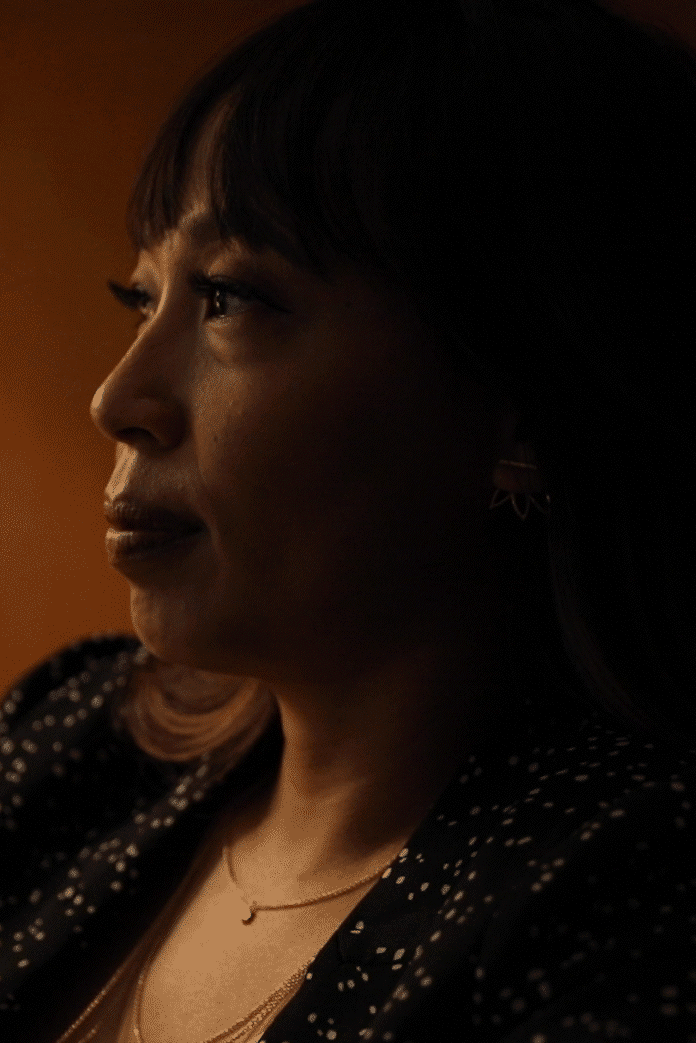
Carla Brizuela-Perez, a licensed clinical social worker in Los Angeles, said part of addressing the mental health impact of colonialism is having culturally sensitive services more widely available, including more Filipino American mental health professionals.
“Understanding imperialism and colonialism — all that stuff that has played a role — that’s already something that at least emotional labor is removed,” she said.
She also heals alongside her clients by allowing herself to cry.
“Of course, many times it’s like, ‘Oh, you’re supposed to be this objective person.’ But I feel that hurt also, and I want to let the client know that that hurt is valid,” she said. “So in that way, I’m trying to help reshape what therapy looks like.”
Meanwhile, Pila’s efforts to decolonize her mental health have made her comfortable with her body — a far cry from the 12-year-old girl who had hoped to scrub her skin white with a bar of papaya soap. She’s also happily married with a 3-month-old daughter.
“My goal as a mom is to make sure my daughter is comfortable in her skin,” she said. “I will never comment on her body. I will never tell her, ‘It’s so good that you’re light skinned! But your nose should be longer.’”
More to Read
About this article
Illustrations by Michelle Lagasca. Art direction by Micah Fluellen. Photos by Christina House, Rodrigo Cid and Myung J. Chun. Photo editing by Calvin B. Alagot. Listening sessions facilitated by Agnes Constante, Ada Tseng, Danielle Fox and Karen Garcia. Audience engagement by Maneeza Iqbal. Search engine optimization by Louisa Frahm.
Sign up for The Wild
We’ll help you find the best places to hike, bike and run, as well as the perfect silent spots for meditation and yoga.
You may occasionally receive promotional content from the Los Angeles Times.

